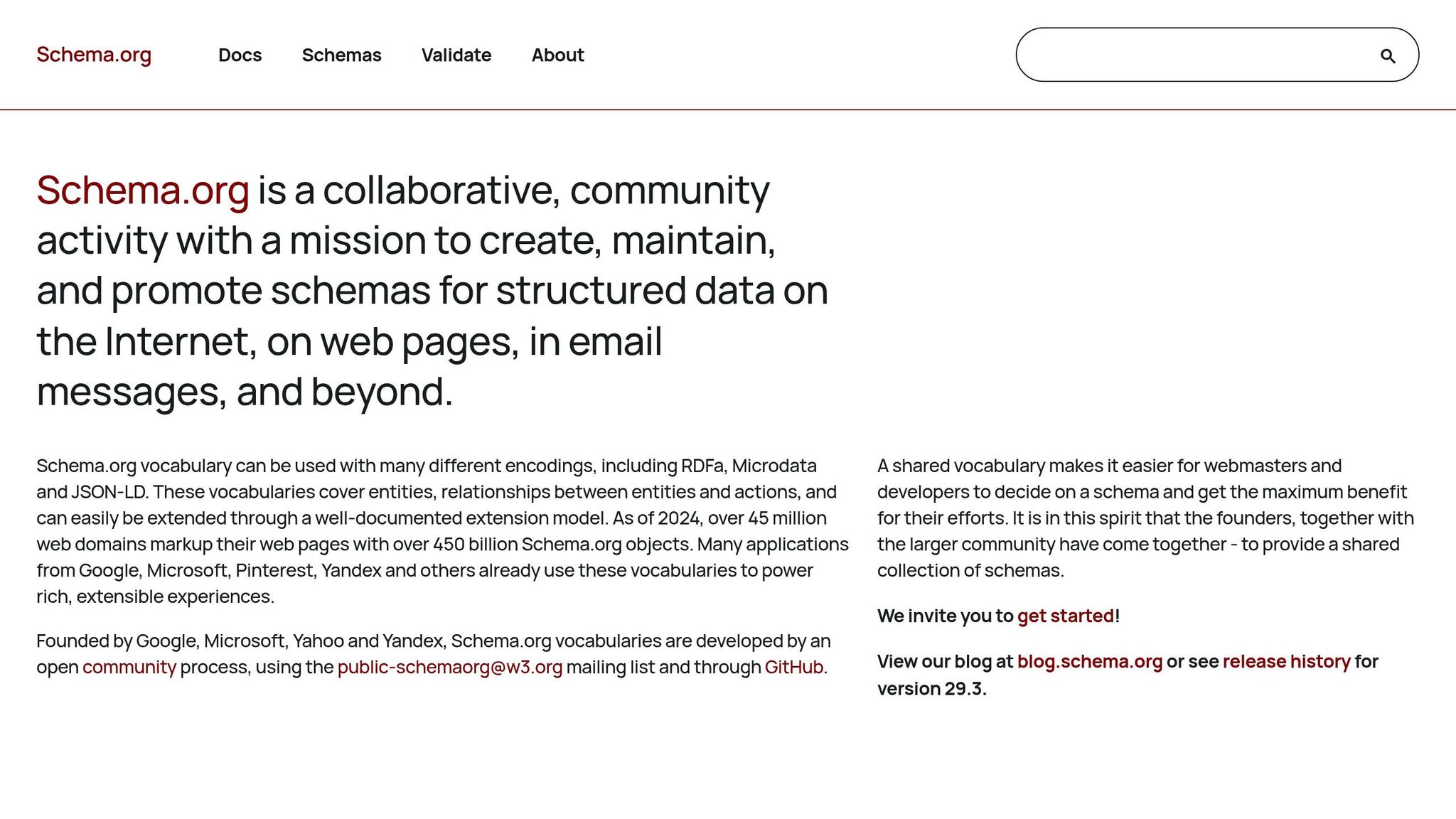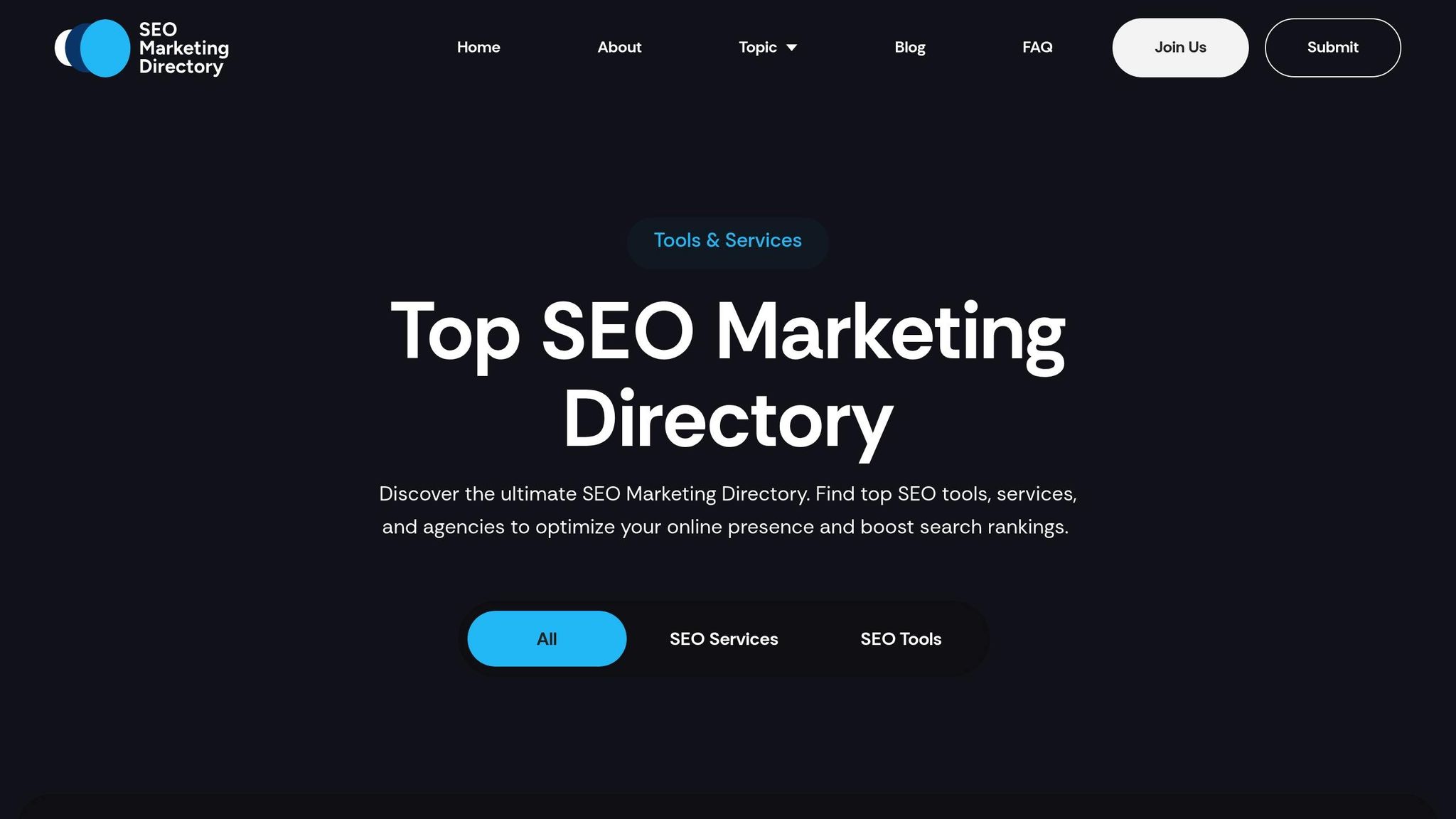Structured data is a type of code that helps search engines clearly understand and display your business's key details, like location, services, hours, and contact information. For local businesses, it’s a powerful tool to stand out in search results with features like rich snippets, Google’s Local Pack, and voice search results. By using structured data, you can improve your visibility in search engines, attract more clicks, and make your business easier to find.
Here’s what you need to know:
- What is structured data? It’s code added to your website to explain your content to search engines.
- Why use it? It helps your business appear in enhanced search results with features like star ratings, maps, and contact buttons.
- How does it work? It uses a standardized vocabulary from Schema.org to label important details like your address, phone number, and services.
- Best format: Use JSON-LD, Google’s recommended format, for easy implementation.
- Key schema types: LocalBusiness, Review, Event, and Service schemas are crucial for local SEO.
- Steps to implement: Identify pages, generate schema code, add it to your site, test with Google’s Rich Results Test, and monitor with Search Console.
Structured data doesn’t guarantee rich snippets but significantly improves your chances of standing out in search results. Consistency and accuracy are crucial, especially for local businesses managing multiple locations or services.
How Structured Data Works in Local SEO
What is Structured Data?
Structured data is a type of code added to your website's HTML that makes your content easier for search engines to understand. While regular HTML focuses on how your website looks to visitors, structured data explains the meaning behind your content, helping search engines grasp details about your business.
This code relies on a standardized vocabulary from Schema.org - a collaborative effort by Google, Microsoft, Yahoo, and Yandex. By using this universal language, search engines can interpret your business information consistently, no matter where it appears online.
When you add structured data to your local business website, you’re essentially labeling key details like your address and phone number with specific tags. For instance, structured data can tell search engines that a particular string of numbers is your business phone number.
There are three main formats for structured data: JSON-LD, Microdata, and RDFa. Google recommends JSON-LD because it’s simpler to implement and maintain. You can add it in a single script tag - usually in the header - without changing the visible content on your site.
Benefits of Structured Data for Local Businesses
Structured data can drastically improve how your business appears in search results, making it easier for potential customers to find and interact with you. One major advantage is increased visibility in Google’s Local Pack, those map-based results that pop up for location-specific searches. This visibility often leads to the creation of rich snippets, which make your business stand out even more.
It’s also a game-changer for voice search. When people use voice assistants to ask questions like, “Where’s the closest coffee shop open now?”, search engines rely on structured data to deliver accurate answers. Businesses with well-implemented structured data are more likely to appear in these voice results - an increasingly important factor as voice searches grow in popularity.
Structured data also reinforces the accuracy of your business details for Google. By signaling that your information is consistent and up-to-date, you can potentially boost your local search rankings.
Beyond rankings, structured data enables your business to appear in specialized search features like event listings, product showcases, and FAQ sections. For example, a restaurant can display its menu directly in search results, or a service provider can highlight their pricing and service areas. These features make your business more appealing and actionable to potential customers.
How Structured Data Creates Rich Snippets
Structured data is also the backbone of rich snippets - those enhanced search results that go beyond the standard blue link and description. Rich snippets present extra details in a visually engaging format, helping your business grab attention.
Here’s how it works: when search engine crawlers visit your site, they process your structured data markup. This information is stored in their databases and linked to your business listing. When someone searches for relevant terms, the search engine uses this data to create enhanced results.
One common example is star ratings. If you mark up customer reviews with structured data, search engines can display your average rating and review count directly in search results. This not only makes your listing stand out but also gives potential customers instant social proof.
Business hours are another example. When your operating hours are properly marked up, they can appear in search results, letting customers know if you’re open. You can even use structured data to highlight temporary changes, like holiday hours, to avoid confusion or missed opportunities.
Contact information is another valuable rich snippet. On mobile devices, marked-up phone numbers often become clickable links, making it easier for customers to call you directly from the search results.
Location-based snippets are especially helpful for businesses that depend on foot traffic. When your address is marked up correctly, search engines can display maps, driving directions, and even calculate distances for users - making it simple for customers to find you.
The key to creating rich snippets lies in keeping your structured data accurate and complete. Search engines are more likely to display enhanced results when your data is error-free and regularly updated. Outdated or inconsistent information can hurt your search performance, so maintaining your structured data is essential.
Important Schema Types for Local SEO
Main Schema.org Types for Local Businesses

When it comes to structured data for local SEO, the LocalBusiness schema is the foundation. However, using more specific subtypes tailored to your industry can greatly improve search engine accuracy. While you could label every business as a generic LocalBusiness, search engines favor precise classifications that align with your actual niche.
For example, the Restaurant schema is perfect for dining establishments, as it can display delivery zones and real-time table availability right in search results. Similarly, the MedicalBusiness schema helps healthcare providers, such as doctors or clinics, showcase their specialties, accepted insurance plans, and appointment booking options.
Other useful subtypes include ProfessionalService for consultants, lawyers, and accountants, and HomeAndConstructionBusiness, which suits contractors, plumbers, and electricians. AutomotiveBusiness is designed for car dealerships and repair shops, while LodgingBusiness works well for hotels or bed-and-breakfasts.
Beyond the primary business classification, additional schemas can enhance your visibility. For instance, the Review schema highlights customer feedback in search results, while the Service schema allows businesses to showcase specific offerings. A dental office, for example, could mark up services like teeth cleaning, root canals, and cosmetic procedures with individual pricing and descriptions.
Businesses hosting events can benefit from the Event schema. A bookstore might use it to promote author signings, while a fitness studio could highlight special classes or challenges. Each schema type serves a distinct purpose, but their success depends on including the right properties.
Required and Recommended Properties
Once you've chosen the right schema type, implementing its required properties accurately is essential for boosting local visibility. The basics - name, address, and telephone number - are non-negotiable. These details must match your Google Business Profile and other directory listings to avoid confusing search engines.
Adding geographic coordinates (latitude and longitude) is another key step. You can find these by right-clicking your business location on Google Maps. This is especially useful for businesses located in shopping centers or large office complexes, as it helps search engines pinpoint your exact spot.
Opening hours are critical for customer convenience and should always be up-to-date. Use the correct format (e.g., "Mo-Fr 09:00-17:00") and revise them immediately if your hours change. Many businesses lose potential customers due to outdated information in search results.
Your URL should direct users to your main website, and sameAs properties can link to your social media profiles or other online platforms. Including a price range (e.g., "$" for budget-friendly or "$$" for mid-range) helps set customer expectations.
Incorporating customer reviews through aggregateRating properties can make a big impact. Include details like the average rating, total reviews, and the rating scale (usually 1-5 stars).
Don’t forget about images - they make your business stand out visually. Use photos of your storefront, logo, or products, and ensure the image URLs are functional and load quickly.
Using Multiple Schemas for Complex Businesses
For businesses with multiple locations or diverse services, a layered schema approach is often necessary. For example, a restaurant chain can use the Organization schema for the corporate entity, while each individual location has its own Restaurant schema nested beneath it.
The Department schema is ideal for large retailers with distinct sections. A sporting goods store, for instance, might use separate schemas for camping gear, athletic shoes, and team sports departments.
Service-based businesses can combine LocalBusiness with multiple Service schemas. A veterinary clinic, for example, might list general pet care, emergency services, and grooming as distinct offerings, each with its own pricing and availability.
When individual professionals work within a larger organization, the Person schema can be a valuable addition. A law firm could use the Organization schema for the practice while marking up each attorney with their specialties, education, and contact details.
For businesses that operate seasonally or have temporary locations, layering Event schema on top of standard business markup can be highly effective. A tax preparation service, for instance, could use the LocalBusiness schema year-round while adding Event schema during tax season to highlight extended hours or special promotions.
To keep everything running smoothly, it's crucial to maintain clear hierarchies and avoid inconsistencies between schema types. Each piece of information should fit logically into the overall structure, ensuring no overlaps or conflicts that could confuse search engines.
How to Add Structured Data to Your Website
Choosing Between JSON-LD, Microdata, and RDFa
When it comes to structured data, JSON-LD is Google’s preferred method. Why? It’s straightforward and doesn’t tangle with your existing HTML. JSON-LD lives in a separate <script> tag, making it easy to add, edit, or remove without messing up your page layout.
Microdata, on the other hand, integrates directly into your HTML using attributes like itemscope and itemprop. While functional, it’s not as user-friendly. Even minor updates require diving into your HTML, which increases the risk of breaking your page.
Then there’s RDFa (Resource Description Framework in Attributes). This format is more intricate and was originally designed for semantic web applications. It uses attributes like typeof and property to embed data, but its complexity often makes it less appealing for most use cases.
For local businesses, JSON-LD is the way to go. It allows you to keep all your structured data in one neat block of code, which can be easily placed in the <head> section of your site. Plus, many content management systems and plugins support JSON-LD, streamlining the process even further.
Step-by-Step Schema Implementation Process
Once you’ve chosen your format, here’s how to implement schema markup effectively:
- Identify key pages: Focus on pages like your homepage, contact page, and location pages. Don’t overlook service pages or your “About” page - they can also benefit from schema markup.
- Generate your schema code: Use tools like Google’s Structured Data Markup Helper or a schema generator. Enter your business details carefully, ensuring they match your Google Business Profile exactly. Even minor differences in your business name, address, or phone number can confuse search engines.
-
Add JSON-LD code to your site: Insert the code into your website’s
<head>section. For example, here’s a simple LocalBusiness schema in JSON-LD format:<script type="application/ld+json"> { "@context": "https://schema.org", "@type": "LocalBusiness", "name": "Downtown Coffee Roasters", "address": { "@type": "PostalAddress", "streetAddress": "123 Main Street", "addressLocality": "Portland", "addressRegion": "OR", "postalCode": "97205" }, "telephone": "+1-503-555-0123", "openingHours": "Mo-Fr 07:00-19:00, Sa-Su 08:00-17:00" } </script> - Test your schema: Use Google’s Rich Results Test to confirm your markup is error-free. This tool highlights any issues, so you can fix them before going live.
- Monitor results: Google Search Console’s Enhancement reports show how Google processes your structured data. Regularly check for errors or warnings, especially after updating your site.
Top Tools for Creating and Testing Schema Markup
After implementing your structured data, these tools can help you validate and maintain it:
- Google’s Rich Results Test: This tool lets you paste your URL or code snippet to see how Google interprets your structured data. Errors are flagged in red, while warnings appear in yellow, making it easy to identify and resolve issues.
- Google Search Console: Use this for ongoing monitoring. The Enhancement reports track your schema performance and alert you to any errors. The URL Inspection tool is particularly handy for testing specific pages.
- Schema Markup Generators: Online tools simplify the process by guiding you through forms to generate JSON-LD code. Just double-check the output for accuracy before adding it to your site.
- WordPress Plugins: Plugins like Yoast SEO and RankMath come with built-in schema generators. These tools automatically add LocalBusiness markup based on your site settings, though you might need to tweak the output for more specific needs.
- Technical SEO Tools: Platforms like those found in the Top SEO Marketing Directory offer advanced features for managing structured data at scale. These tools often include generators, validators, and performance tracking for rich snippets across multiple locations or websites.
For businesses with multiple locations, consider using schema management platforms. These tools can deploy consistent structured data across all your sites, saving time and ensuring accuracy when updates are needed.
Using Structured Data for Better Search Results
How to Get Rich Snippets with Structured Data
Rich snippets transform plain search results into eye-catching listings that can include star ratings, business hours, photos, and action buttons like "Place an Order." These enhanced listings not only grab attention but also drive more clicks to your local business.
To achieve rich snippets, accurate schema markup is essential. Start with the LocalBusiness schema as your foundation, and layer it with AggregateRating and Review schemas to add visual appeal. For example, Joe's Pizza implemented LocalBusiness schema markup and added an AggregateRating schema showing a ratingValue of "4.5" and a reviewCount of "250." This allowed Google to display star ratings and reviews, which significantly boosted their click-through rates.
If your business hosts events or promotions, the Event schema is a powerful tool. Joe's Pizza used it to promote their "Live Music Night", specifying details like the event name, start and end dates, and location. As a result, the event appeared in Google's event listings, increasing visibility.
Other businesses have also seen success. A local bakery used schema markup to display review stars, a photo, operating hours, and a "Place an Order" button directly in search results. This enhanced listing helped them attract more traffic.
Even details like payment methods and services can show up in rich snippets when properly marked up. For instance, "Sample Clothes Store" used LocalBusiness schema to include their name, address, phone number, operating hours, accepted payment methods, and geo-coordinates, ensuring their information was accurately displayed in search results and map packs.
These strategies not only improve your search visibility but also set the stage for strengthening your Local Pack and Knowledge Panel results.
Improving Local Pack and Knowledge Panel Results
Structured data might not directly determine Local Pack rankings, but it plays a critical role in how Google understands and displays your business information. By aligning your website's structured data with your Google Business Profile, you ensure consistency and technical accuracy, which boosts your organic search features.
"Structured data on a location page doesn't directly affect Google Business Profile (GBP) features like the Map Pack or reviews, but it enhances organic search features, such as rich results, by improving how search engines interpret your website." - Chelsea Alves, Senior Manager, Content Marketing at Forsta
Knowledge Panels, those prominent information boxes that showcase details like business hours, location, reviews, and photos, are another area where structured data can make a difference. While your Google Business Profile is the primary trigger for Knowledge Panels, structured data helps enhance the information displayed.
"Does structured data directly trigger Google knowledge panels? The answer is no, but it does feed and enhance your knowledge panel." - Martha van Berkel, CEO, Schema App
To improve your chances of appearing in a Knowledge Panel, consistency is key. Use the same name across your website, social media, and other authoritative sources, leveraging the sameAs property in your schema. For businesses with multiple locations, employing department schema helps Google understand the relationships between branches and service areas.
While structured data boosts visibility, it's not without its challenges.
Pros and Cons of Structured Data for Local SEO
Structured data comes with clear benefits, but it’s important to know its limitations to set realistic expectations for your local SEO efforts.
Advantages: Rich snippets make your search results more appealing, increasing click-through rates and driving qualified traffic. By organizing your information with structured data, search engines can better match your business to relevant local searches.
"Structured data is not a direct ranking factor, but it enhances how search engines understand your content, which can lead to better local search rankings." - Louis Pretorius, Author, Bird Marketing
AI Compatibility: With the rise of AI systems like ChatGPT, structured data provides the framework these tools rely on to deliver accurate and relevant information.
"Structured data is essential for AI systems like ChatGPT, helping them deliver accurate and relevant information. Local landing pages using structured data, such as LocalBusiness or GeoCoordinates schema, provide a framework that AI can easily process for precise results." - Chelsea Alves, Senior Manager, Content Marketing at Forsta
Limitations: Despite its advantages, structured data doesn’t guarantee rich snippets or Knowledge Panels. Google decides what gets displayed. Implementing structured data also requires technical expertise and ongoing updates to keep your information accurate. For businesses with multiple locations or complex services, this can be time-consuming. Even with perfect execution, results in competitive markets may take time as search engines build trust in your data.
While challenges exist, incorporating structured data into your local SEO strategy can significantly enhance your online visibility and search performance. The key lies in balancing effort with expectations.
sbb-itb-5be333f
How to Write Schema For Local Business A-Z Tutorial | Advanced Local SEO Part 2 | Brock Misner
Tools and Resources for Local SEO Success
Getting structured data right and improving local SEO performance requires the right tools and expertise. By using resources that align with your strategy, you can significantly enhance your local search visibility. One useful place to start? The Top SEO Marketing Directory, which helps you discover tools and services tailored to your needs.
Finding Local SEO Tools Through Top SEO Marketing Directory

The Top SEO Marketing Directory serves as a curated hub for trusted SEO tools and services. It connects businesses with SEO agencies and software providers specializing in technical SEO, local optimization, and content strategies. Whether you're looking for advanced tools or professional help to implement structured data, this directory organizes resources by their specific expertise. Many of the featured providers also offer keyword research tools and content optimization services, helping you stay on top of local search trends and ensure your structured data aligns with market demands.
Key Features of Top SEO Marketing Directory
The directory uses a tiered system to match businesses with the right tools and services based on their goals and budget:
- Basic Plan: Free access to essential listings, perfect for small businesses starting to implement structured data.
- Premium Plan: For $49 per month, this plan provides access to advanced SEO tools and specialized agency listings, covering areas like programmatic and mobile SEO.
- Enterprise Solutions: Designed for larger organizations, this option offers custom pricing, personalized strategies, and dedicated support.
In addition to tool listings, the directory offers valuable features like SEO auditing, link building, and analytics. These tools allow you to evaluate your current structured data setup, improve your website's authority, and track performance with measurable results. With a focus on expert advice, the platform ensures that recommendations are tailored to your industry and local market, helping you make informed decisions every step of the way.
Conclusion: Key Takeaways
Structured data changes the game for how local businesses interact with search engines. When used effectively, schema markup turns your website into a rich, machine-readable resource that search engines can understand and highlight in search results.
It's a powerful tool for boosting online visibility. Enhanced search features often play a key role in whether potential customers pick your business over the competition.
To get the most out of structured data, use JSON-LD, prioritize required properties, and ensure your data is accurate across all platforms. This forms the backbone of better search performance. Pair structured data with other local SEO strategies, like maintaining consistent NAP (Name, Address, Phone) details, creating high-quality content, and building strong local citations. Together, these efforts create a well-rounded approach to improving your local search presence.
Don’t forget to test your schema markup using tools like Google's Rich Results Test and Schema Markup Validator. Regular testing ensures your data stays aligned with search engine updates.
For additional support, consider using specialized tools or expert services from resources like the Top SEO Marketing Directory. Whether it's technical help, ongoing monitoring, or advanced strategies, the right tools can take your implementation from basic to exceptional.
Start with your core business information, implement step by step, and consistently monitor your results. Structured data isn’t just a one-off task; it’s a strategic investment that can give your business a lasting edge in local search.
FAQs
How does structured data help my local business stand out in search results?
Structured data plays a key role in helping your local business shine online. It provides search engines with detailed information about your business - like your location, operating hours, contact details, and even customer reviews. This detailed input allows search engines to showcase your business more prominently in features like local packs, knowledge panels, and rich snippets.
By simplifying how search engines interpret your content, structured data improves your chances of showing up in the right local searches. This means more visibility, more potential customers, and better engagement. It's an effective way to enhance your online presence and build stronger connections with your local community.
What are the key schema types for local businesses, and how do they boost search visibility?
For businesses rooted in their communities, the LocalBusiness schema and Review schema play a crucial role. The LocalBusiness schema allows search engines to pull and display essential details about your business - like your address, phone number, and operating hours - directly in search results or on maps. This ensures potential customers can access accurate information without any hassle.
Meanwhile, the Review schema showcases customer ratings and feedback, giving your business an edge by making it more appealing in search results. Together, these schemas not only help search engines better understand your business but also boost your local search rankings, increase visibility, and drive more potential customers to your website.
How can I properly implement structured data to boost my local SEO?
To make structured data work effectively for local SEO, stick to the JSON-LD format. Google favors this format because it’s straightforward to implement and manage. Make sure your structured data complies with Google’s guidelines and accurately reflects the content on your website. This alignment helps prevent errors and boosts your chances of qualifying for rich results.
Don’t forget to test your structured data regularly. Tools like schema validators or rich results testers can help you spot and fix problems before they impact your visibility. Keeping your markup accurate and consistent not only reduces errors but also increases the likelihood of earning rich snippets, giving your local search presence a real boost.


